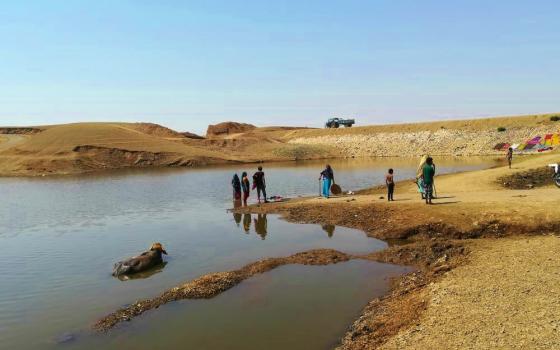Until a decade ago, Hatu Devi could not even think of going to a grocery shop near her house. The resident of Jalimpura village of Banswara district in the northwestern Indian state of Rajasthan had to depend on her husband or other male members in the family to meet the family's needs.
Since her marriage at 13, Devi had to always cover her head and face with her pallu, the edge of a sari. She was not allowed to talk to men, even men in her family, except in an emergency.
"Even then, I had to ensure that my face was not seen and head bowed, as face-to-face conversation was not the norm then," Devi, now 48, told Global Sisters Report.
But the world has become different for the mother of three today, thanks to a group of Catholic nuns.
"I no longer depend on my husband or others. I manage on my own now," she said.
The Hindu woman credits the Missionary Sisters, Servants of the Holy Spirit (SSpS), popularly known as the Holy Spirit Sisters, for the "revolutionary transformation" in her life.
Hatu Devi is among hundreds of villagers in the northwestern Indian state of Rajasthan who had life-changing experiences after the nuns started working among them in 2012. Through water projects, micro-loans, farming diversity and other means, the nuns not only checked migration of villagers to cities but also fought several social evils that subjugated women, such as child marriage.
Devi said she is bold enough now to go to the police station if required. As a village council member, she discusses issues facing Jalimpura. The village council passes local issues and forwards them to higher government bodies to be carried out.
She is among 3,500 women and 4,000 men from 1,282 families in eight villages of the Sajjangarh block in Banswara district who have found new meaning in their lives after the intervention of the Holy Spirit nuns, who have reached to almost 10,000 people since their arrival.
The villages are situated within a 3-mile radius of the office of the nuns' Rajasthan Bhil Child-Focused Community Development Project in Goeka Baria village. The nuns work under Udaipur Diocese.
Nearly 95% of the families belong to the indigenous Bhil community and are Muslim or Hindu.
The five nuns unofficially started their mission in Goeka Baria 15 years ago.
Sr. Jaisa Antony said their biggest challenge was to retain the people in villages in Rajasthan, as many used to migrate to Gujarat, an industrially developed neighboring state.
"[There] they lived in unhygienic and subhuman conditions and could not send their children to schools," the nun said.
The migration peaked during the summer because of water scarcity.
"Our study in villages convinced us that poverty and distress migration would stop if we could find a solution to the water crisis and encourage people to cultivate their farms," Antony told GSR.
In collaboration with Germany's Kindernothilfe and Holistic Child Development India, the nuns initiated a project, Child Focused Community Development, which started in January 2011 and ended in March 2019.
"Our main objective was to reduce migration, particularly of women and children, improve the coverage and quality of education, and find sustained livelihood," Antony said.
Kamala Devi, a mother of two, said her family started eating vegetables in 2012.
"Earlier, we depended mostly on forest leaves and seasonal produce to keep us alive. The change came after we joined the [self-help groups run by] Catholic nuns, who promised us a new life with dignity," the 32-year-old woman told GSR.
She said her family had survived on the income from cultivating their crops once per year on their tiny farm and occasional jobs of her husband.
"But today, our life has changed so much that our children are studying in schools and we have surplus income," Kamala Devi told GSR.
Her sons, 13-year-old Davis Garasiya and 8-year-old Arjun Garasiya, are in the seventh and third grades, respectively. She earns an average of 4,000 rupees ($58) monthly from tailoring while her husband works in his farm.
Kamala Devi said before the nuns entered their village, even women could not see each other's faces.
"We recognized each other with the help of our sari or legs, plus our voices. This worked only with close neighbors and family members," she said with a smile.
While walking her home, her husband walked in front, and she followed him, head and face covered.
"I never talked to anyone on the way," she said.
The nuns' intervention has freed them from strict veil norms. They have not given up wearing veils, but they do not cover their faces now.
"Now we do our work in the house and outside without any interference from the male members," Kamala Devi said.
Her husband, Kamalesh Garasiya, said they never imagined "such a wonderful life" until the nuns arrived in 2012 and their work began to show fruit.
"Now I have purchased a tractor with the farm income and sisters' consistent support," the 32-year-old farmer told GSR.
The nuns' stress on water conservation has helped improve the water table, ending the shortage of water for drinking and irrigation.
"Previously, I cultivated only once in a year, as there was no water. But now I raise three crops in a year, as we have plenty of water," Garasiya said.
Antony said the sisters knew it was impossible to reduce migration without improving agriculture in the area.
"With the support of the villagers, we repaired and deepened 85 wells [in the villages] and dug five new ones that now supply water for drinking and irrigation in the targeted villages," Antony said.
Krishna Chandra, a retired government school teacher who lives in Goeka Pargi, said the nuns also encouraged people to repair old check dams to harvest rainwater.
An old check dam was repaired with government support in Goeka Pargi and now supplies water for 50 houses in the village.
"The nuns also helped us construct farm bunds [small dams] and leveled lands that helped retain rainwater, improve the water table, and make soil more fertile," Chandra told GSR.
The nuns had their share of opposition.
"Some local leaders tried to oppose the nuns' work, saying it was a façade for religious conversion," Chandra said. The opponents included village council chiefs in some places.
"As people began to experience the benefit of the sisters' work, their opponents did not succeed," he added.
"The sisters also networked with the government Krishi Vigyan Kendra [Agriculture Science Centre] of Banswara to ensure the farmers got the latest technology and knowhow," Chandra said.
The center also tested seed variety to augment farm produce, such as maize, wheat, chickpea and rice, along with seasonal vegetables. Previously, most farmers had only grown wheat.
"We are indebted to the nuns in this life and life after because when they came here, we had nothing. Now we are all self-sufficient," Chandra said.
Sr. Nirupama Bilung, another Holy Spirit nun who assists Antony, says they also encourage people to go for organic farming.
"Many houses in these villages have compost pits that have helped the farmers to minimize the use of chemical fertilizer," Bilung told GSR.
Economic means, other empowerment for women
The nuns have also brought together more than 900 women through 72 self-help groups and started income-generation programs such as tailoring, bamboo works, poultry farming and goat rearing, among others.
The saving and credit activity through these groups helped the women avoid taking out loans from money lenders. Hatu Devi said the loan she received from the self-help groups has helped her build a concrete house for her family.
Bilung said the sisters' activities in the villages have helped bring women out of "the four walls of their houses. Many women such as Hatu Devi are active in decision-making in their families and in the village," the nun said.
Poji Devi, 65, said she is happy her daughters-in-law are enjoying the freedom denied to her when she was young.
"Earlier, women were not respected. But things have begun to change. My daughters-in-law are no longer restricted to the kitchen or farmland," the mother of 11 told GSR.
The changes have also reduced the maternal mortality rate.
"During our time, nobody was even taken to the hospital, even for a complicated delivery," Poji Devi said.
The nuns opened a dispensary in their campus and taught the villagers to deliver babies in hospitals. With the help of the government's Integrated Child Development Services, which provides for early childhood care and development, the sisters also give nutrient-rich food to pregnant women and lactating mothers. Infants are vaccinated and given nutritious food.
"Once a month, health workers come to the village for immunizations. Nobody is afraid of it. Earlier, even if government staff approached us, we never allowed any immunizations, as we were afraid that they might harm us," Poji Devi said.
The nuns' presence gave a major boost to the pioneering efforts done in the area by the Udaipur Diocese, which opened a primary school in Goeka Baria in 1959. Two Holy Spirit nuns are engaged in the education ministry.
The nuns helped expand the school through the 10th grade in 2013. In 2018, they built a new wing with funds they solicited from Stichting Zijn, a Dutch welfare organization, to give more facilities to the students.
Sr. Tessie Varkley, a Holy Spirit nun who teaches in the school, said her congregation's efforts over the years have brought "immense changes among the villagers."
But one challenge the nuns have not been able to tackle is child marriage.
"Child marriage is still prevalent because it so rooted in the social fabric of society" in the villages, Varkley told GSR.
"Sometimes, we find our children missing from classes. It is only when they return, we find their marriage was fixed."
Legal marriage for women is 18, and 21 for men in India. However, poor and illiterate people in many parts of Rajasthan and other states still follow the patriarchal tradition of child marriage.
"We need to create more awareness to end the practice. It will take quite some time," Varkley said.
Antony, who was preparing to shift to her new place of appointment in Pune in June, said she is happy to leave on a satisfied note.
"We have succeeded in ending distress migration and water crises and helped increase farm income and educate children," she said. "They have become independent and self-sufficient. What they now need is occasional guidance that our sisters will continue to give."
Their biggest achievement, she said, is helping women to remove the veil that had kept them hidden and subjugated for so long.
[Saji Thomas is a freelance journalist based in Bhopal, a central Indian city. He has worked for several mainstream newspapers such as The Times of India. This article is part of a collaboration between GSR and Matters India, a news portal that focuses on religious and social issues in India.]







